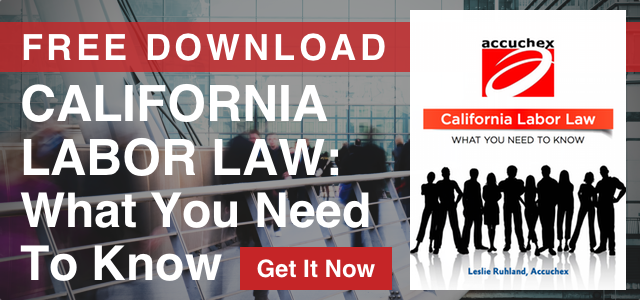 Legal statistics show that due to violations of labor law, California employers often find themselves facing employee lawsuits. The truth is that many business owners and their managers often break employment laws unknowingly. And, unfortunately, this can result in employee claims which can lead to time-consuming and costly fines and even lawsuits.
Legal statistics show that due to violations of labor law, California employers often find themselves facing employee lawsuits. The truth is that many business owners and their managers often break employment laws unknowingly. And, unfortunately, this can result in employee claims which can lead to time-consuming and costly fines and even lawsuits.
Complying With Labor Law: California Among the Top Four States For Lawsuits
In 2014, U.S. companies had almost a 12% chance of an employment lawsuit being filed against them.
However, in a number of states - including California - the percentage is much higher. These particular states have discrimination laws that go beyond federal guidelines, and these create additional obligations for employers and greater risks for insurers.
According to the New York-based specialist insurer Hiscox. these suits are costly:
The average total costs of claims that resulted in a defense and settlement payout is $125,000, Hiscox says. The average self-insured retention (deducible) for these charges was $35,000. Without Employment Practices Liability insurance, these companies would have had to pay an additional $90,000. In addition, 81% of charges resulted in no payment by the insurance company — which highlights the “nuisance potential” of employment charges, such as a loss of goodwill or reputational damage.
There are also many California labor laws regarding employment discrimination. Although some are similar to federal laws, they are intended to afford additional protections for employees. While this a good thing for employees, it complicates the compliance burden for their employers.
Labor Law California: Common Employee Claims to Avoid
Despite the best efforts and intentions of employers in California, avoiding employee lawsuits can be challenging. And while there are multitudes of employer violations that can be committed - knowingly and otherwise - there are a few common ones that make up the bulk of legal cases:
Anti-discrimination/fair employment practices
These include additional protected classes or impose restrictions on smaller-size companies that need to comply.
Credit checks
Employers are prohibited from taking employment actions related to the credit history or credit report of an employee or job applicant.
Criminal background checks
Employers are restricted inquiring about — or requiring disclosure of — a job applicant’s criminal record or criminal history.
E-Verify
All private-sector employers must enroll in the federal e-Verify system and use it to ensure all new hires are legally allowed to work in the U.S.Pregnancy accommodation
Employers must make reasonable accommodations to the known limitations related to pregnancy of an applicant or employee.Steps Businesses Should Take to Ensure Compliance with Labor Law Requirements
Since they have to follow both federal and state labor law, California employers must be especially diligent in their HR practices. But there are steps you can take to ensure that your organization doesn't Unintentionally break these laws. You can take specific steps, for example, to eliminate unlawful bias in decisions and processes and eliminate harassment.
Here are some specific tips:
- Education: Keep up on the latest changes in employment law.
- Hiring: Eliminate considerations that have nothing to do with competence. Also, make sure your hiring documents are legal and that your interviewers are aware of what can and cannot be asked of a job candidate.
- Dismissals: As with hiring, eliminate considerations that have nothing to do with competence. Also, make sure your communications and documentation are appropriate and clear. Assume that whatever you say can and will be used against you.
- Work Environment: Make clear what is appropriate activity by enacting a company-wide program that will educate everyone on what is acceptable and unacceptable workplace behavior. Also, create an environment in which employees feel free to raise concerns regarding possible discriminatory behavior and are confident that those concerns will be addressed.
- Harassment prevention: Take appropriate steps to prevent harassment. Establish an effective complaint or grievance process, provide anti-harassment training to managers and employees, and take immediate and appropriate action when an employee complains.
Complying With Labor Law - California Style
If your organization would like to learn more about its obligations, or acquire resources to deal with these types of situations, Accuchex recently partnered with HR Solutions Partners to offer its customers the most up-to-date and professional human resources management solutions available. To learn more about the different levels of Human Resource Management services available, please follow this link.
To learn more about the services Accuchex provides, click on the button below to download our free guidebook.


